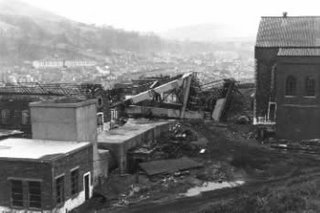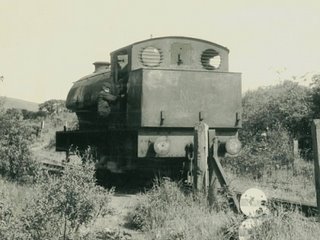D. R. Davies VII: The Way of The Prodigal
 D. R. Davies returned from Manchester with an acute sense of failure. He had come to regard himself as brilliant and sensitive, a young man of culture, better than his fellows. To be once more working underground, therefore, was a mortifying shame. Later, Davies was to use this to make a point about the ability of education to improve a man's morals:
D. R. Davies returned from Manchester with an acute sense of failure. He had come to regard himself as brilliant and sensitive, a young man of culture, better than his fellows. To be once more working underground, therefore, was a mortifying shame. Later, Davies was to use this to make a point about the ability of education to improve a man's morals:"It is important to note that education had made no fundamental difference to me, except to intensify my egotism and inflate my pride. Its net effect was to isolate me from my fellows. My increased knowledge, wider interests, deeper culture resulted in my becoming a greater, more miserable sinner."
Davies came to see in his failure, not the foolishness of his embarking on a course of action he was not able to follow through, but the oppression of the capitalist system. In other words, his socialism had become a way of avoiding responsibility for his actions.
From 1907 to 1912, Davies worked as a miner. He became active in Trade Union politics, as well as the Independent Labour Party. By 1909, he had become a member of his local Trade Union executive, and was soon speaking from ILP platforms. At first, he avoided church, still guilty about his lapse into Unitarianism. However, in time he returned to the church, and began preaching again. A member of the library Committee of the Miners' Institutes at Maesteg, he was able to continue his reading.
Eye-trouble caused by coal-dust forced Davies to take a job on the surface, a loss of status. He was on a gang loading timber for pit-props, under the direction
 of a tyrannical foreman. Singled out for his education and socialism, Davies came to hate him. After an incident at the pit-head, he nursed a grudge against the foreman, swearing that he would 'do' him.
of a tyrannical foreman. Singled out for his education and socialism, Davies came to hate him. After an incident at the pit-head, he nursed a grudge against the foreman, swearing that he would 'do' him.And, when his father recovered enough to start working again, that is exactly what Davies did. He quit work, and, that very day, ambushed the foreman and gave him such a beating that it was a long time before he could return to his duties. And Davies left home.
He became a stoker on a steamer for New York, but this was more than he could bear. He returned to Liverpool, louse-ridden and feeling thoroughly sorry for himself. At a Church Army Home in Birkenhead, he was cleaned up, and after this he became a tramp, walking through the English countryside, doing odd jobs and sleeping in the 'casual wards' of workhouses.
After some time he 'came to himself.' He realised just how bad the lifestyle of the tramp was for him, and wrote to his mother asking her to send five shillings to the Post Office, Cardiff. When he arrived, it was there. Davies spent most of the money, and had to walk to Bridgend, arriving just in time for the last train to Maesteg. There, he found his father asleep, but his mother was still awake, waiting for him:
"She had a hot bath ready, and a supper of my favourite dish, tea, bread and butter and kidney beans. Then she talked to me. That was typical: she saw to my physical needs first, then addressed herself to my soul. I shall never forget her words: "don't you see, my boy, that the way of the sinner is hard?" So gentle, so cncomplaining, so full of mercy and compassion."
Davies returned to the mine, despite his attack on the foreman (who may well have decided that he'd deserved it), and returned to the chapel. Soon, he was once more feeling drawn to the ministry. In time, he was accepted as a candidate for the Congregation ministry by Bradford United College. Given a job as night-watchman, Davies was able to study for the entrance examination. In 1912, he began to train for the Congregationalist Ministry.
Labels: D. R. Davies

0 Comments:
Post a Comment
<< Home